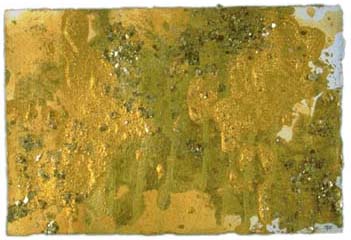 |

|
 Harry Fonseca, The Discovery of Gold in
California, 7.7.97, #21
Photograph by Catherine Buchanan
Fonseca's heritage--Nisenan
Maidu, Hawaiian, Portuguese--can be viewed, in part, as a product of the
Gold Rush. His Nisenan
ancestors were the original occupants and caretakers of the land where gold
was discovered. In 1839, John Sutter brought ten Native Hawaiians to California,
among them
Fonseca's ancestors Ioane Keààla O Kaàina and Sam Kapu.
Sutter's reliance on these Native Hawaiians and local Nisenan Maidu to build
his fort
and
empire is not to be
underestimated. In the end, Sutter lost his fortune, and his native workers
lost their land, way of life, and, in some cases, their lives. With the
Gold Rush, their world would
be changed forever. It is miraculous that California's native peoples, cultures,
and environment survived at all. That they did is a testament to their
courage, tenacity,
resilience, and ingenuity.
Fonseca's artwork enables us to deal
with the painful legacy of the California Gold Rush in a thoughtful and embracing way.
"Being in the environment in that country, feeling the energy of the land, gave me a
chance to work with the subject matter on a different level than before," Fonseca
said. "The upheaval that took place on all levels was the catalyst for this body of
work. It started with the land and Native American cultures that were disrupted if not
destroyed, and evolved into how the Gold Rush affected everybody. The drama just grew and
grew." |
 |